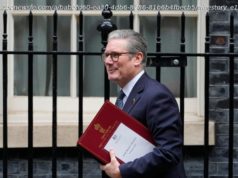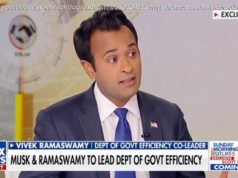Mueller once again finds himself catapulted into the midst of historic events after appointed special counsel into Trump-Russia probe
WASHINGTON — Robert Mueller took office as FBI director in 2001 expecting to dig into drug cases, white-collar misdeeds and violent crime. A week later was Sept. 11 .
Overnight, his mission changed and Mueller spent the next 12 years wrestling the agency into a battle-hardened terrorism-fighting force.
Now, Mueller once again finds himself catapulted into the midst of historic events: The Justice Department has named him special counsel to investigate potential coordination between Russia and the Trump team during the 2016 presidential election and related matters.
Republicans and Democrats alike praised Mueller, 72, as someone widely respected for his integrity and independence.
As FBI chief, Mueller stood alongside James Comey, then deputy attorney general, during a dramatic 2004 hospital standoff over federal wiretapping rules. The two men planted themselves at the bedside of the ailing Attorney General John Ashcroft to block Bush administration officials from making an end run to get Ashcroft’s permission to reauthorize a secret no-warrant wiretapping program.
FBI Director Robert Mueller, left, accompanied by Attorney General John Ashcroft, meet with reporters at FBI headquarters in Washington, Thursday, Sept. 13,2001, to discuss the investigation of the terrorist attacks.
Republican Rep. Jason Chaffetz of Utah, chairman of the House oversight committee, tweeted that Mueller was «a great selection. Impeccable credentials.»
Senate Democratic leader Chuck Schumer of New York said Mueller’s appointment gave him «significantly greater confidence that the investigation will follow the facts wherever they lead.»
Democrats are hailing the appointment of special counsel to investigate the Trump administration and Russian election interference as a victory, …
Mueller’s effort to shift the FBI’s top priority from solving domestic crimes to preventing terrorism was a daunting challenge: Even preventing 99 out of 100 terrorist plots wasn’t good enough for a traumatized nation.
In response, the FBI shifted 2,000 of the 5,000 agents in its criminal programs into national security.
During Mueller’s tenure, terrorists were thwarted in their efforts to bring down a trans-Atlantic flight in 2001, a Detroit-bound jetliner on Christmas in 2009 and U. S.-bound cargo planes carrying printer cartridge bombs in 2010.
CBS News spoke with Mueller about a flight that did go down at the hands of Libyan terrorists. Pan Am Flight 103 exploded over Lockerbie, Scotland, killing all 259 aboard — mostly Americans — and 11 others on the ground in December 1988.
At the U. S. Justice Department, Robert Mueller, then a young prosecutor, was tasked with leading the investigation. Now, 25 years later, Mueller…
As a young prosecutor, Mueller was tasked with overseeing the U. S. investigation of the Boeing 747.
At the 25-year anniversary of the explosion, CBS News’ Bob Orr spoke with Mueller about how the case still haunts the former FBI director because the bombers remain at large.
«I think the planning had to take at least several months, » Mueller said. «It was well thought out, well planned and well executed.»
Two terrorist incidents occurred toward the end of Mueller’s watch at the FBI: the Boston Marathon bombing and the Fort Hood shootings. Both weighed heavily on him, he acknowledged in an interview two weeks before his departure in 2013.
«You sit down with victims’ families, you see the pain they go through and you always wonder whether there isn’t something more» that could have been done, he said.
FBI director Robert Mueller says the threat of terrorism from al Qaeda remains the bureau’s top priority. Mueller is stepping down next month aft…
Mueller spoke again with CBS News ‘ Bob Orr before leaving the bureau.
«Over the years [terrorism] migrated to Somalia and most particularly to Yemen …, » he said and emphasized that the U. S. has to remain vigilant. Mueller also addressed how the FBI aggressively approached the Benghazi attack investigation, saying that people would be brought to justice.
When he became director, Mueller had «expected to focus on areas familiar to me as a prosecutor — drug cases, white-collar criminal cases and violent crime, » he said in 2012. Instead, «we had to focus on long-term, strategic change. We had to enhance our intelligence capabilities and upgrade our technology. We had to build upon strong partnerships and forge new friendships, both here at home and abroad.»
In hindsight, the transformation was largely a success.
At the time, though, there were problems and Mueller said as much. In a speech near the end of his tenure, he recalled «those days when we were under attack by the media and being clobbered by Congress; when the attorney general was not at all happy with me.»
Among the issues: The Justice Department’s inspector general found that the FBI circumvented the law to obtain thousands of phone call records for terrorism investigations. Mueller decided that the FBI wouldn’t take part in abusive interrogation techniques of terrorist suspects, but the policy wasn’t effectively communicated down the line for nearly two years. In an effort to move the FBI into a paperless environment, the bureau spent over $600 million on computer systems that were way behind schedule and in one case had to be scrapped as obsolete.
For the nation’s premier law enforcement agency, it was a rocky trip.
But there were successes as well and an extraordinary vote of confidence: Congress, at the Obama administration’s request, approved a two-year extension for Mueller to remain at his post until 2013, when he was replaced by Comey, the director fired last week by President Trump .
Federal Bureau of Investigation (FBI) Director Robert Mueller (L) acknowledges a standing ovation alongside Attorney General Eric Holder (R) and Deputy Attorney General James Cole (C) during a farewell ceremony in Mueller’s honor at the Department of Justice on Aug. 1,2013. Mueller is retiring from the FBI after 12 years as director.
Mueller was born in New York City and grew up outside of Philadelphia. As a Marine officer, he led a rifle platoon in Vietnam and was awarded a Bronze Star, Purple Heart and two Navy Commendation Medals.






